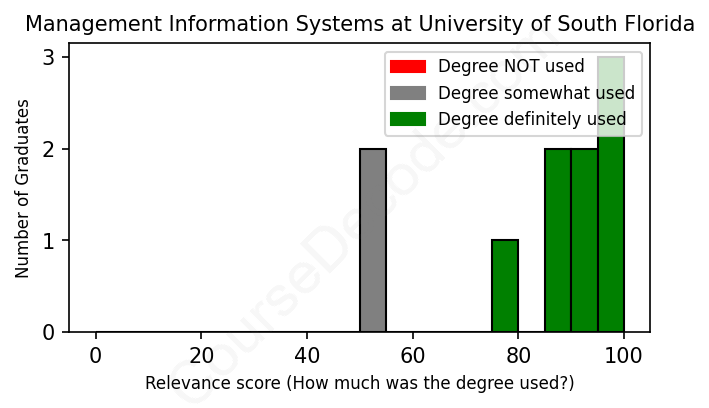
First, some facts. Of the Management Information Systems graduates from University of South Florida we've analyzed , here's how many have used (or NOT used) their degree in their career:

These are estimates based on AI analysis of 10 LinkedIn profiles (see below).
The verdict? Significantly above average. Overall, with an average relevance score of 83%, Management Information Systems graduates from University of South Florida have a much higher likelihood (+16%) of finding work in this field compared to the average graduate across all fields:
And for comparison, here's the chart for all profiles we've looked at across all degrees.
Also, after graduating, only 20% of these graduates have pursued further education other than another Bachelor's degree (such as a Masters degree or other), compared to the average across all profiles of 35%. This suggests a Bachelors degree is enough for most Management Information Systems graduates, and it's normal to look for work straight after graduation.
See the details:
|
Relevance score: 100% We think this person has gone into a career highly relevant to their degree. We think this person has gone into a career highly relevant to their degree.
DEGREE INFOGraduated in 2018 from University of South Florida with a Bachelor's degree in Management Information Systems. No other secondary education since. JOB HISTORY SINCE GRADUATIONAssistant Vice President Citi Feb 2021 - Mar 2022 Vice President  Citi Mar 2022 - Present ABOUTOperational Risk Officer with extensive experience in data risk management. Bilingual subject matter expert in Management Control Assessment (MCA), and compliance matters across multiple businesses within Operational Risk Management (ORM). Over twelve years of experience in the banking and regulatory industries. Knowledgable in the following areas: issues management, ongoing monitoring, compliance training, and remediation projects. Posses dynamic business acumen, excellent research, writing and oral skills. Work effectively within a team environment and capable of managing programs and projects independently. |
The top 10 most common jobs done by the graduates we've analyzed (ranked most common to least) are:
When looking at the job trajectories of graduates from the Management Information Systems program at the University of South Florida, a few common themes emerge. Many have found roles in technical support or analysis, such as Client Support Technician, Business Analyst, or Database Administrator. These positions often require a combination of technical know-how and analytical skill, which aligns with the core teachings of the degree. Notably, roles like Business Data Analyst and Data Science Lead Analyst are prime examples where graduates are expected to apply their learning on a daily basis, showcasing relevance to their academic background. They typically work with data, systems, and organizational processes, making them highly suitable for those who studied MIS.
However, it's clear that not all positions directly leverage the full breadth of knowledge taught in the program. Many graduates occupy roles that only partially connect to their degree, like Client Support Supervisor or Financial Advisor, where they might use a few skills here and there but aren’t fully utilizing their academic training. In contrast, roles in project management, system integration, and data analysis are much more on-point, demonstrating that while there is a mix of direct and tangential relevance, those exploring more specialized or technical positions tend to align better with their Management Information Systems education. Overall, the landscape shows that there are plenty of opportunities that utilize the MIS degree effectively, even if some jobs take a broader approach to skill application.
Here is a visual representation of the most common words in job titles for Management Information Systems graduates (this is across all Management Information Systems graduates we've analyzed, not just those who went to University of South Florida):

Graduates from the Management Information Systems program at the University of South Florida have generally followed promising career trajectories that are relevant to their field. Many of them land entry-level positions in tech support, analyst roles, or IT management soon after graduation. For instance, several graduates began their careers as support technicians at healthcare institutions or as temporary associates at financial organizations. These initial roles seem to set a solid foundation for their careers, allowing them to gain valuable hands-on experience and technical know-how that are crucial in the tech-driven job market.
Fast forward five to ten years later, and it's apparent that many of these graduates have made significant advancements in their careers. A good number have moved up the corporate ladder into senior or even executive positions, showing a clear trend towards growth in roles related to data analysis, project management, and technical consulting. Some have transitioned into impressive positions like Vice President at major corporations like Citi, while others have ventured into entrepreneurial roles or prestigious research positions, including roles at institutions like MIT. Overall, it appears that the degree has been a valuable asset for many graduates, leading to fruitful and relevant careers in the tech industry.
Honestly, a Bachelor’s degree in Management Information Systems (MIS) at the University of South Florida can be a bit of a mixed bag in terms of difficulty. It has some challenging aspects, especially if you’re not super comfortable with tech or numbers, since you’ll be dealing with things like databases, programming basics, and systems analysis. But then again, if you enjoy problem-solving and working with technology, you might find it more manageable. Generally, it’s not considered one of the hardest degrees out there, but it does require a good amount of dedication and time to study. So, if you stay on top of your assignments and actually engage with the material, you can definitely do well!
Most commonly, in the LinkedIn profiles we've looked at, it takes people 4 years to finish a Bachelor degree in Management Information Systems.
Looking at these graduates from the University of South Florida, it seems like a mixed bag in terms of earnings. Some of them landed solid roles pretty quickly, especially those who went into companies like Citi or even started their own ventures. For instance, the ones who climbed the corporate ladder at Citi typically ended up with decent salaries, especially with titles like Vice President, which is a pretty big deal. On the other hand, folks like the Client Support Technician from Moffitt Cancer Center might not be raking in the big bucks since those entry-level support roles usually don't pay as well over time, even though they’ve been with the same organization for years. Overall, it looks like a few of these grads are making good money, while others might still be working their way up to those bigger paychecks.
Here is a visual representation of the most common words seen in the "about" section of LinkedIn profiles who have a Bachelor degree in Management Information Systems (this is across all Management Information Systems graduates we've analyzed, not just those who went to University of South Florida). This may or may not be useful:

Here are all colleges offering a Bachelor degree in Management Information Systems (ordered by the average relevance score of their Management Information Systems graduates, best to worst) where we have analyzed at least 10 of their graduates:
| College | Score | Count |
|---|---|---|
 The University of Alabama The University of Alabama
|
93 | 18 |
 The University of Georgia The University of Georgia
|
84 | 12 |
 University of South Florida University of South Florida
|
83 | 10 |
 University of Alabama University of Alabama
|
83 | 19 |
 San Jose State University San Jose State University
|
79 | 16 |
 University of Maryland Baltimore County University of Maryland Baltimore County
|
79 | 10 |
 University of Georgia - Terry College of Business University of Georgia - Terry College of Business
|
77 | 18 |
 University of Arizona University of Arizona
|
76 | 14 |
 Penn State University Penn State University
|
73 | 11 |
 Ohio University Ohio University
|
73 | 10 |
 Oklahoma State University Oklahoma State University
|
73 | 17 |
 Baylor University Baylor University
|
73 | 12 |
 University of Houston, C.T. Bauer College of Business University of Houston, C.T. Bauer College of Business
|
73 | 20 |
 Texas A&M University Texas A&M University
|
70 | 10 |
 The University of Texas at Austin The University of Texas at Austin
|
68 | 12 |
 University of Houston University of Houston
|
68 | 19 |
 East Carolina University East Carolina University
|
64 | 11 |
 Washington State University Washington State University
|
64 | 14 |